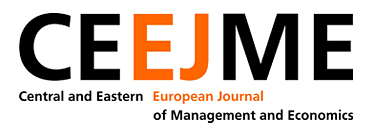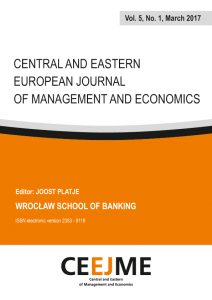CENTRAL AND EASTERN EUROPEAN JOURNAL OF MANAGEMENT AND ECONOMICS
Vol. 5, No. 1, 5, March 2017, WSB UNIVERSITY IN WROCŁAW
Editor: Joost Platje
Contents: PDF download >>
Vol. 5, No. 1, 9-29, March 2017
The appropriateness of electronic reverse auctions – an explanation from the incomplete contract theory and the resource dependence theory
Authors: Cees J. GELDERMAN, Janjaap SEMEIJN
Open University of the Netherlands, The Netherlands
Bart Willem NAGEL
Lyreco Benelux, The Netherlands
Article: PDF download >>
Abstract: Despite the growing importance of electronic reversed auctions (ERAs) few empirical studies have explored the appropriateness of ERA usage. Most commonly, transaction cost theory has been used for these ERA-studies, relying on arguments that consider asset specificity as the primary explanation for organizational boundaries. We seek a more thorough explanation for perceived Electronic Reverse auctions (ERA) appropriateness, using multiple theoretical perspectives. This study includes insights and variables from the incomplete contract theory and the resource dependence theory. A conceptual model for ERA appropriateness was developed from the buyer perspective. This model was empirically validated using a survey of 176 purchasing professionals. The findings suggest a positive impact of buyer power on ERA appropriateness, while total interdependence does not appear to affect ERA appropriateness. The results further indicate that asset specificity stimulates ERA usage. ERA-minded purchasers consider ERAs as a tool for exploiting buyer power and for imposing relationship investments on suppliers. At the same time, variables related to collaboration do not appear to be important for ERA appropriateness from the perspective of the buyer. Suppliers are required to make relation-specific investments, but are not valued for their relational efforts. The novelty of this article Scholars have taken several approaches to investigate and to explain company’s sourcing decisions that include ERA use. We address an important gap in the literature by using the incomplete contract theory in combination with the resource dependence theory to provide a better understanding of buyers’ perceived ERA appropriateness.
Keywords: Auctions, Procurement, Transactional relationships), Other – electronic reversed auctions
JEL: D44, H57, L14, M29
Vol. 5, No. 1, 31-47, March 2017
The Wielkopolska Innovative Platform (WPI) as a Modern Medium of Communication Between Science and Business in Healthcare
Authors: Aleksandra SZULCZEWSKA-REMI
Poznań University of Economics & Business, Poland
Krzysztof KUS
Poznań University of Medical Sciences, Poland
Article: PDF download >>
Abstract: According to literature data not many scientific studies exist about the influence of innovations on the hospital performance also in Poland, therefore the aim of this paper was to study assessed the use of databases collected on Wielkopolska Innovative Platform (WPI), an innovative internet tool realised since 2009 by the Department of Business Activity and Agriculture (WDGR) of the Town Council of the City of Poznań in cooperation with scientific institutes, research centres and universities, for healthcare services using knowledge discovery in databases analysis. The study was preceded by snowball sampling analysis of literature data also complement the Triple Helix concept of University-Industry-Government relations in Knowledge
Society introduced by Etzkowitz and other authors. The major result of the research has shown that Wielkopolska Innovation Platform is a successful medium and communication platform between science, business and government used in healthcare. WPI strengthens the market ability and sharing of scientific achievements in healthcare into practical productive forces and thereby contributes to local economy.
Keywords: Triple-helix model, Healthcare, Knowledge commercialization, Academic entrepreneurship
JEL: H75, I23, L26
Vol. 5, No. 1, 49-62, March 2017
Cooperation of High-tech Firms with Public Institutions in Poland: Managerial Perspective
Author: Monika GOLONKA
Kozminski University, Warsaw, Poland
Article: PDF download >>
Abstract: This study examines the cooperation between high-technology firms and institutions aimed at supporting the development of enterprises, such as national agencies and public education institutions, in emerging markets. The research uses qualitative research methods—namely, multiple case studies. An empirical analysis was conducted in 26 high-tech enterprises from emerging market: Poland, including hyper-growth organizations. This study explores the support of the institutions as well as cooperation between firms and public institutions from a managerial perspective. The major problems and obstacles that these firms faced are identified, as are ways of coping with them. The research results extend existing studies by providing empirical insights from high-tech firms in one of the emerging markets in Central Europe.
Keywords: Emerging market, Public institutions, Universities, Cooperation, High-tech firms
JEL: H75, I23, L26
Vol. 5, No. 1, 63-75, March 2017
Comparison of Professional Plans of Students from Rural Areas and Cities in Terms of Economic Mentality
Author: Laura PŁATKOWSKA-PROKOPCZYK
Opole University, Poland
Article: PDF download >>
Abstract: Process of globalization, rapidly progressing nowadays, can cause conflicts between cultural norms and values valid in a globalized society and local values. Similar mechanism may occur on a smaller scale, where culture characteristic of urban centers and rural areas may clash. The purpose of this article is to establish what is the economic mentality of students at the Faculty of Economics of the University of Opole from rural areas and cities by comparative analysis of one of its components – work. The article presents a fragment of own research conducted in April 2016 year. Research is an introduction to the wider research into the economic culture of rural areas. In the course of testing the hypothesis formulated in the context of the economic mentality have been confirmed.
Keywords: Economic mentality, Economic culture, Work, Students, Rural and urban areas
JEL: A22, J24
Vol. 5, No. 1, 77-91, March 2017
Non-Salary Employment Conditions Offered to Foreigners Legally Employed in Poland (study based on the Opole Voivodeship data)
Authors: Sabina KUBICIEL-LODZIŃSKA, Bogdan RUSZCZAK
Opole University of Technology, Poland
Article: PDF download >>
Abstract: The paper discusses selected results of a study carried out among 263 enterprises in the Opole Province. The study involved, among others, non-salary employment conditions the enterprises offer or would be willing to offer to foreigners. These included e.g. housing, meals, payment for travel costs. The issue of non-salary employment conditions is part of studies focusing on economic migration as employment of foreign labour often involves additional costs and obligations for employers. It was determined that, when asked about additional employment conditions that they would be willing to offer to foreign workers apart from the salary, more than 1/3 of the enterprises mentioned the help in finding housing. However, a similar number (27.5%) of respondents also claimed they did not intend to offer (or did not offer) any additional conditions. More than 9% would offer free or subsidised meals, while a similar group (8.9%) – free housing. 7.6% of respondents would fully (or partially) pay for travel costs of foreigners coming to Poland.
Keywords: Nonwage benefits, Foreigners, Poland, Labour market
JEL: J15, J23, J32

